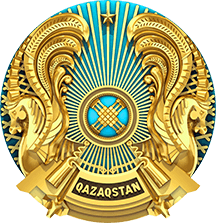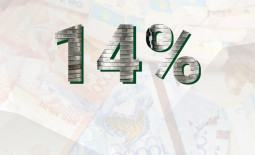Press-release №10. The base rate was raised to 14%
The Monetary Policy Committee of the National Bank of the Republic of Kazakhstan has made a decision to set the base rate at 14% per annum with the interest rate corridor of +/- 1.00 percentage points. Consequently, the rate for the liquidity provision standing facilities set on 15% and for the liquidity withdrawal standing facilities at 13%.
The decision to raise the base rate reflects the National Bank's commitment to anti-inflationary policy at a time of rising inflationary pressures amid realization of geopolitical risks, rise in prices in the world, as well as in countries being the trade partners of Kazakhstan and their transfer to domestic prices. Positive fiscal impulse observed for the third year in a row remains a significant driver for inflationary processes.
Annual inflation in March 2022 accelerated to 12% (8.7% in February 2022) due to the abovementioned factors. The annual growth rate of food and non-food prices reached 15.4% (10%) and 10.9% (8.6%), respectively. The cost of paid services rose by 8.3% (7.1%). The steady acceleration of inflation is characterized by rising prices for a wide range of goods and services, as evidenced by a significant increase in base inflation indicators in March 2022.
Inflation expectations are not anchored and continue to show high volatility. The results of the March 2022 survey indicate a decrease in the optimism of population and a significant increase in inflation expectations, reflecting worsening geopolitical situation and weakening of the exchange rate of the national currency. The quantitative estimate of inflation for the year ahead is 11.4%.
Fiscal policy will exert considerable pro-inflationary pressure. In 2022, the republican budget expenditures will grow by 23.6% with an average growth rate of 16.7% in the previous three years. Continued positive fiscal momentum will exert pro-inflationary pressure in both 2022 and 2023. The transfer from the National Fund to finance the budget deficit in 2022 will amount to 4.6 trillion tenge, which is comparable to the 4.8 trillion tenge in 2020, allocated amid COVID19 pandemic and a 2.5% contraction of GDP. Financing of the republican budget deficit from the assets of the National Fund will have a supportive impact on the exchange rate, but will lead to an increase in demand for imports and weakening of the fiscal position.
Growth of economic activity in Kazakhstan in the first quarter of 2022 amounted to 4.4% in annual terms. After a slowdown in January amid the enforcement of the state of emergency across the country, there has been a positive trend in many sectors of the economy since February. Business activity was supported by high consumer demand. Retail turnover growth accelerated to 3.7% year-on-year in March 2022. Household consumption was also supported by growth in consumer lending and real household incomes.
Monetary factors contribute to the growth of domestic demand as a result of implementation of anti-crisis programs to support the economy. In Q1 2022 the loan portfolio grew by 3.9% (in 2021 the growth was 26.5%). The volume of new loans in the economy in Q1 2022 increased by 25.3% in annual terms (compared to growth of 46.8% in 2021).
However, as the results of March 2022 showed, the increase in the rate is not a deterrent to lending in the context of increasing uncertainty and changes in the terms of lending. Banking sector will continue to adapt to the emerging economic conditions and changes due to potential mergers and acquisitions, as well as the shift in the model of behavior of economic agents from consumption to savings.
On the external sector side, pro-inflationary factors are intensifying. The UN Food and Agriculture Organization’s Food Price Index in March 2022 reached record highs since 1990 amid rising prices for all subsets of food commodities. Global food prices will remain elevated in both 2022 and 2023. This is due to continued uncertainty surrounding the geopolitical crisis, high global fertilizer prices, and rising costs due to supply chain disruptions.
Forecasts for the global oil market demonstrate continued high level of oil prices. According to the U.S. Energy Information Administration (EIA) estimates, oil inventories in OECD countries stood at 2.61 billion barrels by the end of March, slightly higher than the month earlier, but still near the minimum since April 2014. Given the shock in the oil market, the oil price forecast was raised significantly by international organizations. Hence, the price of crude oil will be formed in the range of $90-100 per barrel on average in 2022-2023.
As a consequence of a substantial rise in food and energy prices, a significant increase in inflation in developed economies and countries that are major trading partners of Kazakhstan has been recorded, which will affect the increase in imported inflation.
According to the forecast of the International Monetary Fund, global inflation is expected to remain high in 2022. Inflation in developed countries will be at 5.7% (the previous estimate being 3.9%), and in developing countries at 8.7% (the previous estimate being 5.9%). In 2023, amid an expected weaker global economy and lower energy prices, inflation in developed countries will slow to 2.5%, while in developing countries to 6.5%.
The main risks to inflation on the near horizon are associated with significant fiscal impulse with positive economic dynamics, growth of domestic and external demand, increase in the world prices for food, raw materials and finished goods, high and unanchored inflation expectations, supply chain breakdown, import of high inflation from the countries that are Kazakhstan’s major trading partners.
In the future decisions on the base rate, incoming statistical data and the results of the May – June 2022 forecasting round will play the key role. There remains the room for further tightening of monetary conditions subject to the trajectory of inflation expectations, updated forecasts on inflation, aggregate demand and imports, as well as the risk of realization of possible additional inflation shocks.
Based on the results of the decision, a press briefing of the Chairman of the National Bank of Kazakhstan will be held on April 27, 2022 at 11:00 Nur-Sultan time with the participation of mass media representatives. The next scheduled decision of the Monetary Policy Committee of the National Bank of Kazakhstan on the base rate will be announced on June 6, 2022 at 15:00 Nur-Sultan time.
More detailed information for the mass media representatives is available upon request:
+7 (7172) 775 210
e-mail: press@nationalbank.kz
www.nationalbank.kz




